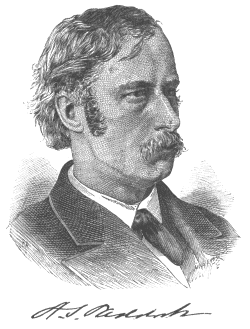Prior to the panic of 1857 there was little interest in practical agriculture in Nebraska Territory. Land ownership was sought for speculative purposes rather than for farming. Riverfront lots in some towns sold for as much as ten thousand dollars; those three or four blocks back brought two thousand dollars; even those as much as half a mile away brought twelve hundred dollars. In most cases the sellers had acquired these properties either by preemption or for just a few dollars only two or three years earlier.

A. S. Paddock. From Alfred T. Andreas, History of the State of Nebraska (1882).
Algernon S. Paddock, who served two terms as United States senator from Nebraska (from 1875 to 1881 and from 1887 to 1893), arrived in Omaha in 1857, traveling by steamer from St. Louis. In a speech delivered to the State Board of Agriculture on September 26, 1878, Paddock recalled the speculative frenzy he encountered in Nebraska Territory:
“When I first arrived at Omaha, after nearly a week’s journey by steamboat from St. Louis, the entire population of that little settlement, as was the custom in those early days, appeared to have swarmed out upon the river banks to give us greeting. The whole number then sojourning there could not have exceeded fifteen hundred at most. And, as I soon learned, not one in twenty of these had any visible means of support, any faith in the country, or any expectation whatever, other than to leave so soon as he could sell his lot in town, or his pre-emption claim in the country, which, quite likely, he had acquired, not by an investment of hard-earned money, but by certain circumlocutory processes-the inventions of speculative genius.
“This description of Omaha life, then, will answer for that of the other towns of the then Territory–nearly all of which were confined to the banks of the Missouri, and no one of which was so large as Omaha. Outside the towns there was nothing–literally nothing–whatever to indicate that either of the factors, labor or capital, whose joint employment with land produces wealth, had begun anywhere to operate agriculturally upon the latter.”
With the Panic of 1857, however, property values plummeted, and town lot schemes collapsed. Many turned to farming to survive. Paddock later considered the financial shocks of 1857 and 1858 to mark the beginning of Nebraska’s agricultural history. He observed, “So long as men could buy a lot or a pre-emption claim one day and sell it the next for 50 or 100 per cent profit, they would not cultivate farms.”



